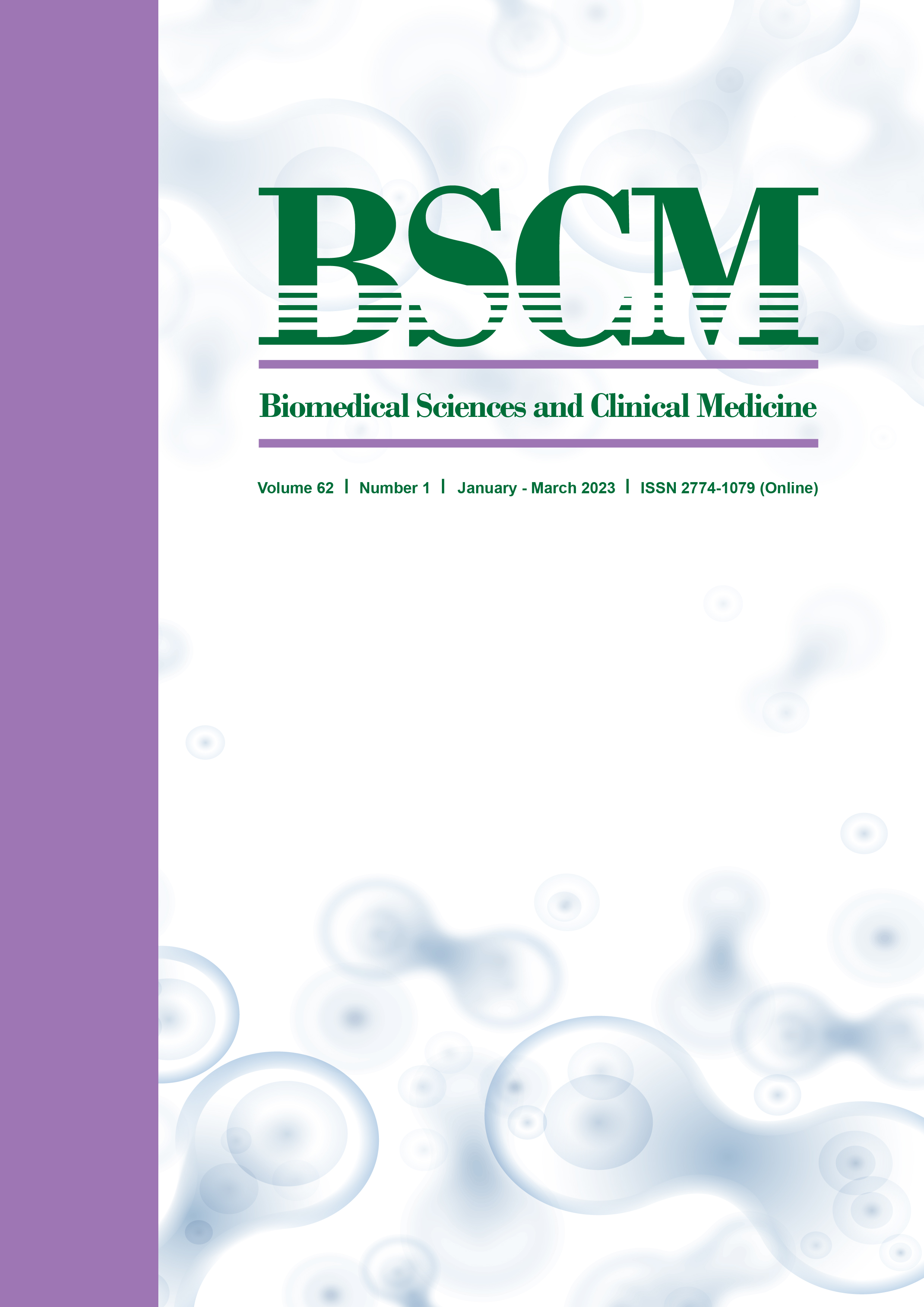The Prevalence and Associated Factors of Depression among Residents in Training in a Northern Thailand University: A Cross-sectional Study
Keywords:
depression, resident training, loneliness, emotional intelligence, burnoutAbstract
Objective This study aimed to investigate the prevalence of and factors associated with depression in residents in training at the Faculty of Medicine, Chiang Mai University.
Methods This cross-sectional study was conducted with Faculty of Medicine residents in training from March to July 2020. We used the nine-item Patient Health Questionnaire (PHQ-9) to determine the level of depression. Binary logistic regression was used to evaluate associated factors: loneliness, burnout, sleep quality, emotional quotients (EQ), and perceived social support (PSS).
Results About one-fifth of the residents in training exhibited depression (47 of 201), and 6.97% had indications of suicidality. Factors showing a positive correlation with depression included loneliness (aOR: 1.27; 95% CI: 1.15-1.40); burnout scales of depersonalization (aOR: 1.18; 95% CI: 1.10-1.25), and reduced personal accomplishment (aOR: 1.10; 95% CI: 1.05-1.14). Factors showed a negative correlation with depression: perceived social support from significant others (aOR: 0.91; 95% CI: 0.85-0.98). Three subscales of EQ included motivation (aOR: 0.82; 95% CI: 0.68-0.99); life satisfaction (aOR: 0.83; 95% CI: 0.70-0.97); level of peace (aOR: 0.76; 95% CI: 0.66-0.87).
Conclusions The prevalence of depression in residents was 23.40%. Loneliness, low social support, and burnout (depersonalization, reduced personal accomplishment) were all associated with depression. Three EQ factors (motivation, life satisfaction, and peace) appeared to have potential for reducing depression.
References
World Health Organization. Depression and other common mental disorders: global health estimates. World Health Organization; 2017.
Mata DA, Ramos MA, Bansal N, Khan R, Guille C, Di Angelantonio E, et al. Prevalence of depression and depressive symptoms among resident physicians: a systematic review and meta-analysis. JAMA. 2015;314:2373-83.
Pasqualucci PL, Damaso LLM, Danila AH, Fatori D, Neto FL, Koch VHK. Prevalence and correlates of depression, anxiety, and stress in medical residents of a Brazilian academic health system. BMC Med Educ. 2019;19:1-5.
Lin DT, Liebert CA, Esquivel MM, Tran J, Lau JN, Greco RS, et al. Prevalence and predictors of depression among general surgery residents. Am J Surg. 2017;213:313-7.
Pereira-Lima K, Loureiro S. Burnout, anxiety, depression, and social skills in medical residents. Psychol Health Med. 2015;20:353-62.
Kaewpornsawan T, Chaiudomsom C. The prevalence and associated factors of depression among residents in training at Faculty of Medicine, Siriraj Hospital. J Psychiatr Assoc Thailand. 2014;59:41-50.
Thamrongvisava S, Pitanupong J. Prevalence and associated factors of burnout syndrome among residents in training at Faculty of Medicine, Songklanagarind Hospital. J Psychiatr Assoc Thailand. 2018;63:309-20.
Goebert D, Thompson D, Takeshita J, Beach C, Bryson P, Ephgrave K, et al. Depressive symptoms in medical students and residents: a multischool study. Acad Med. 2009;84:236-41.
Bailey E, Robinson J, McGorry P. Depression and suicide among medical practitioners in Australia. Intern Med J. 2018;48:254-8.
Carod-Artal FJ, Vázquez-Cabrera C. Burnout syndrome in an international setting. In: Bahrer- Kohler S, editor. Burnout for experts: prevention in the context of living and working. New York: Springer; 2013. p. 15-35
Gómez-Gascón T, Martín-Fernández J, Gálvez- Herrer M, Tapias-Merino E, Beamud-Lagos M, Mingote-Adán JC. Grupo EDESPROAP-Madrid. Effectiveness of an intervention for prevention and treatment of burnout in primary health care professionals. BMC Fam Pract. 2013;14:173.
Beutel ME, Klein EM, Brähler E, Reiner I, Jünger C, Michal M, et al. Loneliness in the general population: prevalence, determinants and relations to mental health. BMC Psychiatry. 2017;17:97.
Boomsma DI, Willemsen G, Dolan CV, Hawkley LC, Cacioppo JT. Genetic and environmental contributions to loneliness in adults: The Netherlands Twin Register Study. Behav Genet. 2005;35:745-52.
Heinrich LM, Gullone E. The clinical significance of loneliness: A literature review. Clin Psychol Rev. 2006;26:695-718.
Grahek I, Shenhav A, Musslick S, Krebs RM, Koster EH. Motivation and cognitive control in depression. Neurosci Biobehav Rev. 2019;102:371-81.
Spiers J, Buszewicz M, Chew-Graham CA, Gerada C, Kessler D, Leggett N, et al. Barriers, facilitators, and survival strategies for GPs seeking treatment for distress: a qualitative study. Br J Gen Pract. 2017;67(663):e700-e8.
Wijeratne C, Johnco C, Draper B, Earl J. Doctors’ reporting of mental health stigma and barriers to help-seeking. Occup Med (Lond). 2021;71:366-74.
Joules N, Williams DM, Thompson AW. Depression in resident physicians: a systematic review. Open Journal of Depression [Internet]. 2014 [cited 2021 Nov 11];3:89-100. Available from: http://dx.doi.org/10.4236/ojd.2014.33013
Summawart S. Burnout among the staff nurses in Ramathibodi Hospital. [dissertion]. Bangkok: Mahidol University; 1989.
Wongpakaran N, Wongpakaran T, Pinyopornpanish M, Simcharoen S, Suradom C, Varnado P, et al. Development and validation of a 6-item revised UCLA Loneliness Scale (RULS-6) using Rasch analysis. Br J Health Psychol. 2020;25:233-56.
Russell D, Peplau LA, Cutrona CE. The revised UCLA Loneliness Scale: concurrent and discriminant validity evidence. J Pers Soc Psychol. 1980;39:472.
Wongpakaran N, Wongpakaran T. A revised Thai Multi-Dimensional Scale of Perceived Social Support. Span J Psychol. 2012;15:1503-9.
Wongpiromsarn Y, Lortrakul P, Wanitrommanee K, Inseeyoung V, Sukmak K, Usaha S. The development of the emotional intelligence screening test for the Thai population aged 12 to 60 years. J Psychaitr Assoc Thai. 2002;47:267-80. (in Thai)
Siriwan U, Thitikalaya N, Soonthonsmai V, Ramabut C, Plomelersee S, Ha M. A confirmatory factor analysis of the emotional quotient management model. Int J Arts Sci. 2015;8:303.
Sitasuwan T, Bussaratid S, Ruttanaumpawan P, Chotinaiwattarakul W. Reliability and validity of the Thai version of the Pittsburgh Sleep Quality Index. J Med Assoc Thai. 2014;97(Suppl 3):S57-S67.
Carpenter JS, Andrykowski MA. Psychometric evaluation of the Pittsburgh sleep quality index. J Psychosom Res. 1998;45:5-13.
Lotrakul M, Sumrithe S, Saipanish R. Reliability and validity of the Thai version of the PHQ-9. BMC Psychiatry. 2008;8:46.
Kroenke K, Spitzer RL, Williams JBW. The PHQ-9: validity of a brief depression severity measure. J Gen Intern Med. 2001;16:606-13.
Shanafelt TD, Dyrbye LN, West CP, Sinsky C, Tutty M, Carlasare LE, et al. Suicidal ideation and attitudes regarding help seeking in US physicians relative to the US working population. Mayo Clin Proc. 2021;96:2067-80.
Tuangpermsub R, Nuallaong W, Charernboon T. Burnout and Related Factor among Residents of Thammasat University Hospital in the COVID-19 outbreak. J Psychiatr Assoc Thailand. 2021;66: 189-202.
Teerabenjakun T, Lerthattasilp T. Prevalence of depression among resident physicians during the Covid-19 Pandemic. J Psychiatr Assoc Thailand. 2021;66:337-50.
Pariwatcharakul P, Ratta-Apha W, Sumalrot T, Wankaew J, Sitdhiraksa N. Depression, quality of life and coping style among Thai doctors before their first year of residency training. Postgrad Med J. 2020;96(1136):321-4.
Charoentanyarak A, Anothaisintawee T, Kanhasing R, Poonpetcharat P. Prevalence of burnout and associated factors among family medicine residency in Thailand. J Med Educ Curric Dev. 2020;7: 2382120520944920.











